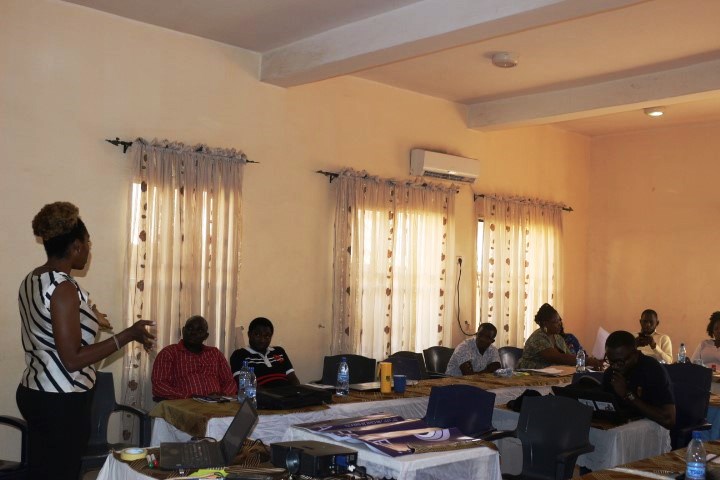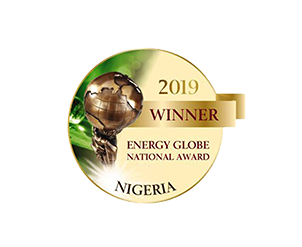
SUB-GRANTS TO WOMEN AND GENDER CSOS IN NIGERIA
WEP has provided sub-grants of 1000 Euros each, under the Women2030 project, to 11 women and gender CSOs in Nigeria to implement activities that promote gender equality and contribute to the overall attainment of SDGs in the country.
The organizations and activities supported are:
Centre for 21st Century Issues (C21st): Capacity building of policy makers and women’s CSOs and awareness raising on climate change and the UNFCCC’s Gender Action Plan (GAP) in Lagos, Ogun and Oyo States of Nigeria. The aim is for policy makers to integrate gender issues in climate actions and for the women’s CSOs to have the skills to push for this to happen.
Centre for Development Support Initiatives (CEDSI): ICT skills training for boys and girls at Government Secondary School Oginigba, Rivers State through setting up a mini computer laboratory in the school and conducting ICT skills training.
Echoes of Women in Africa Initiative (ECOWA): Advocacyfor a gender and equal opportunities law in Lagos State to increase participation of women in politics.
Women and Youth Environmental Safety and Empowerment Organization (EWAY): EWAY is teaching 10 women from Kuje and Kadokuchi communities of Abuja Municipal Area Council (AMAC) and Kuje Area Council respectively, upcycling skills to convert waste plastics into handbags and other products which they can sell and make money and at the same time clean the environment.
Fresh and Young Brains Development Initiative (FYBIN): FYBIN is empowering 3 youths (2 females and 1 male) from Mpape community of Abuja in poultry production. The youths have been trained and given starter packs to set up their poultry farms. FYBIN is also running social media campaigns to raise awareness on issues of gender, vulnerability and SDGs.
Gender Perspectives and Social Development Center (GPSDC): GPSDC is advocating for inclusion of people with disabilities in governance in Anambra State of Nigeria in Urum (Awka North),Osumenyi (Nnewi South) and Ukwulu (Dunukofia) Local Government Areas covering the 3 senatorial zones.
Kwande Sisters Foundation (KSF): KSF is training 4 women and girls on tailoring skills in Kwande Local Government Area of Benue State.
Murna Foundation: Murna Foundation is working to strengthen advocacy on gender and women’s engagement in achieving SDGs goal 5 in Katsina State of Nigeria specifically in the following Local Government Areas – Daura, Malumfashi, Batagarawa, Rimi, Kankia and Kaita
Niger Delta Women’s Movement for Peace and Development (NDWPD): NDWPD is carrying out Capacity building and skills development in Catering, Soap making and Coconut oil production for 30 women in Isoko North, Oshimili North and Warri South Local Government Areas of Delta State
Organized Center for Empowerment and Advocacy in Nigeria (OCEAN): OCEAN has proposed to build capacities of policy makers and CSOs in Plateau State of Nigeria on mainstreaming SDGs in policies and programmes of the state.
Ziongate Empowerment Initiative for the Less Privileged (ZEIP):ZEIP is advocating for policy and law on inclusive education in Kano State of Nigeria.
The project, “Women CSOs Networking to Realize the Sustainable Development Goals,” also known as “Women2030 project” is being implemented in about 52 countries of the world by the following global and regional women and gender organizations: Women Environmental Programme (WEP); Women Engage for a Common Future (WECF); Global Forest Coalition (GFC); Gender and Water Alliance (GWA); and Asia Pacific Forum on Women, Law and Development (APWLD), with support from the Department of Development Cooperation of the European Commission. The project has the following strategic objectives:
- Build capacity of women’s and gender-focused civil society organizations on planning, monitoring and implementation of the SDGs/post 2015 agenda and the climate agreement.
- Create awareness at all levels of gender-equitable best practices and progress of national post-2015 SDG plans
- Ensure more gender-responsive SDGs/post 2015 plans with participation of women and women’s organizations.
In the same vein, WEP has also provided sub-grants of N600,000 each to 8 Civil Society Organizations – 4 each in Zamfara and Benue States, under the project “Ensuring Effective Implementation of Programmes, Policies and Legislations, that Contribute Towards Achieving Gender Equality in Nigeria by 2030.”
The organizations are:
Environment and Climate Change Amelioration Initiative (ECCAI), Nigerian Association of Women in Agriculture (NAWIA), Initiative for Women’s Health Development and Right Protection (WRAHI) and Community Links and Human Empowerment Initiative (CLHEI) from Benue State. Others are Life Helpers Initiative (LHI), Voluntary Aid Initiative (VAI), Millennium Development Centre (MDC) and Future Hope Foundation (FHF) from Zamfara State.
The organizations are expected to:
- Conduct interactive meetings with women in selected rural communities in theses states to identify their priority needs and push for their inclusion in the States or National Budget
- Monitor implementation of selected capital projects in the States and National Budgets to ensure they deliver positive results for the youth, women and children
The project,“Ensuring Effective Implementation of Programmes, Policies and Legislations, that Contribute Towards Achieving Gender Equality in Nigeria by 2030” is supported by the Kingdom of Netherlands and is being implemented in Benue and Zamfara States over a period of 5 years (November 2016- December 2020), targeting Legislators, Legislative Aides, States’ Executives; Civil Society Organizations; Traditional and Religious Leaders.
The objectives of this project include:
- Advocate for policies and legislations that promote women participation at all levels of decision making, and remove all obstacles (social, political, cultural and economic) hindering women’s empowerment and participation in decision making and infringing on their rights.
- Ensure effective implementation of programmes and projects through capacity building of CSOs, budget monitoring and information sharing.
- Raise awareness amongst stakeholders on the fundamental rights of women


